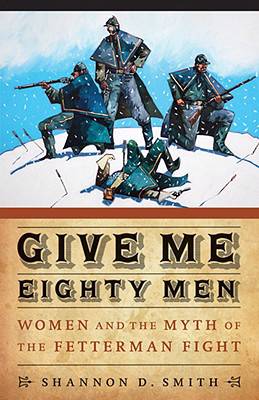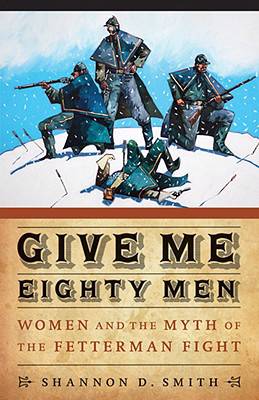
- Afhalen na 1 uur in een winkel met voorraad
- Gratis thuislevering in België vanaf € 30
- Ruim aanbod met 7 miljoen producten
- Afhalen na 1 uur in een winkel met voorraad
- Gratis thuislevering in België vanaf € 30
- Ruim aanbod met 7 miljoen producten
Zoeken
€ 60,95
+ 121 punten
Uitvoering
Omschrijving
"With eighty men I could ride through the entire Sioux nation." The story of what has become popularly known as the Fetterman Fight, near Fort Phil Kearney in present-day Wyoming in 1866, is based entirely on this infamous declaration attributed to Capt. William J. Fetterman. Historical accounts cite this statement in support of the premise that bravado, vainglory, and contempt for the fort's commander, Col. Henry B. Carrington, compelled Fetterman to disobey direct orders from Carrington and lead his men into a perfectly executed ambush by an alliance of Plains Indians. In the aftermath of the incident, Carrington's superiors--including generals Ulysses S. Grant and William T. Sherman--positioned Carrington as solely accountable for the "massacre" by suppressing exonerating evidence. In the face of this betrayal, Carrington's first and second wives came to their husband's defense by publishing books presenting his version of the deadly encounter. Although several of Fetterman's soldiers and fellow officers disagreed with the women's accounts, their chivalrous deference to women's moral authority during this age of Victorian sensibilities enabled Carrington's wives to present their story without challenge. Influenced by these early works, historians focused on Fetterman's arrogance and ineptitude as the sole cause of the tragedy. In Give Me Eighty Men, Shannon D. Smith reexamines the works of the two Mrs. Carringtons in the context of contemporary evidence. No longer seen as an arrogant firebrand, Fetterman emerges as an outstanding officer who respected the Plains Indians' superiority in numbers, weaponry, and battle skills. Give Me Eighty Men both challenges standard interpretations of this American myth and shows the powerful influence of female writers in the nineteenth and twentieth centuries.
Specificaties
Betrokkenen
- Auteur(s):
- Uitgeverij:
Inhoud
- Aantal bladzijden:
- 262
- Taal:
- Engels
- Reeks:
Eigenschappen
- Productcode (EAN):
- 9780803215412
- Verschijningsdatum:
- 1/06/2008
- Uitvoering:
- Hardcover
- Formaat:
- Genaaid
- Afmetingen:
- 153 mm x 217 mm
- Gewicht:
- 458 g

Alleen bij Standaard Boekhandel
+ 121 punten op je klantenkaart van Standaard Boekhandel
Beoordelingen
We publiceren alleen reviews die voldoen aan de voorwaarden voor reviews. Bekijk onze voorwaarden voor reviews.







